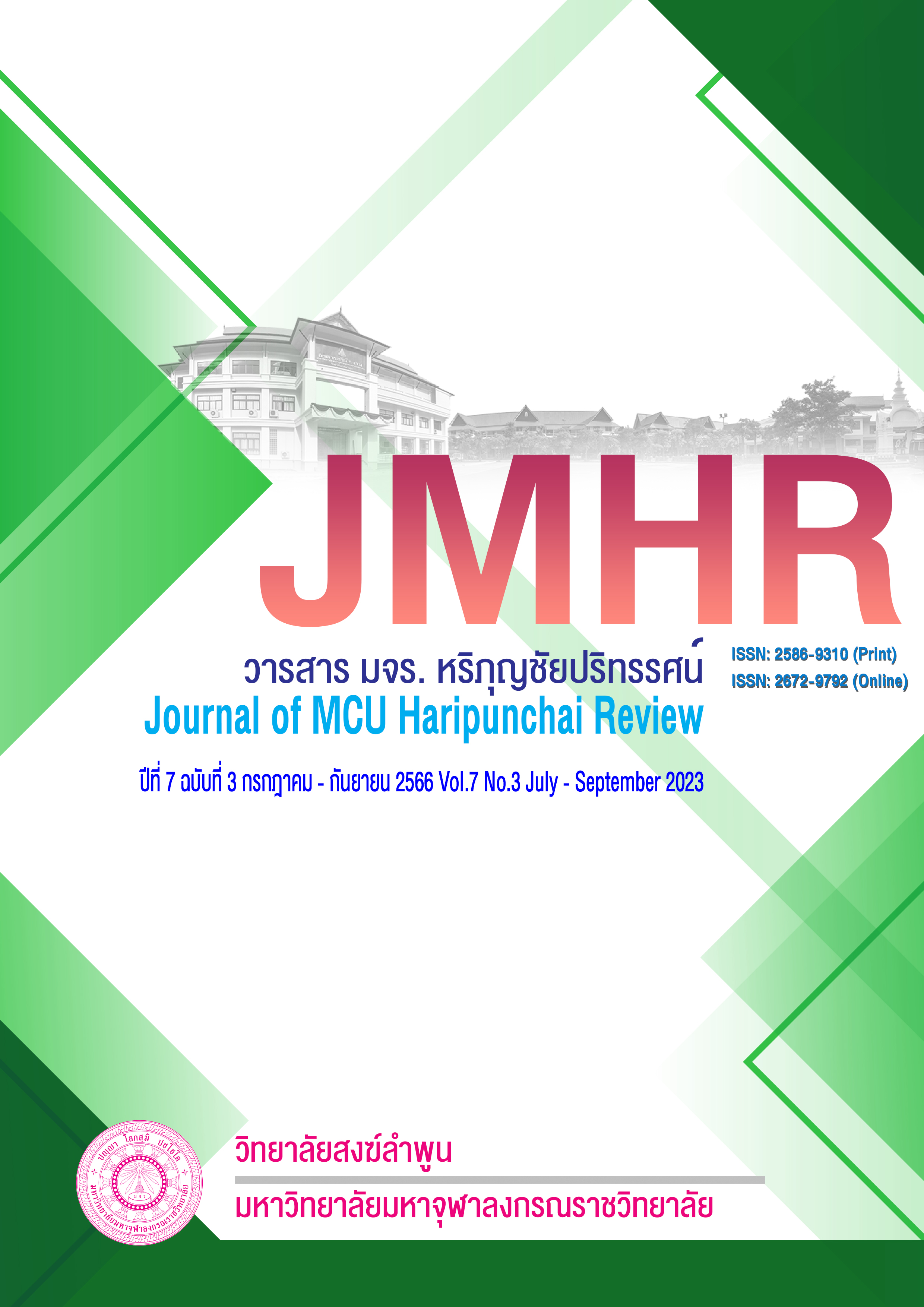Buddhadhamma Integration For To Strengthening The Ethics Of The Village Headmen At Tha Wang Pha District, Nan Province.
Main Article Content
Abstract
This article is part of the research on Buddhadhamma integration for to strengthening the ethics of the village headmen at Tha Wang Pha district, Nan province. The purposes of this research were 1 to study the general conditions, the operation of the mission of Village Headmen, the village of Tha Wang Pha District, Nan province. 2. To study the relationship between 4 Bhavana Principles and the ethical duties of Village Headmen. Tha Wang Pha District, Nan Province. 3. Propose a model for integrating 4 Bhavana Principles, with the strengthening of the moral ethics of Village Headmen. Tha Wang Pha District, Nan Province.
The results showed that
1) The participation level of follow the ethical model of village headmen in Tha Wang Pha District, Nan province. Follow the ethical model Overall, The highest level ( = 4.64)
2) The Ethics with four Bhavanas and The participation level of follow the ethical model of village headmen in Tha Wang Pha District, Nan province. The statistical data is 0.01, and the relationship is very high
3) The mode of combining 4 Bhavanas principle with the ethics of adult gifts is as follows 1. Physical development behave as a good role model and suitable for leadership 2. Social development Respect the rules of living with others. 3. Mental development Have morality in work and adhere to the ideology of the leader. 4. Intellectual Development keep seeking knowledge to develop oneself and the village and community
Article Details

This work is licensed under a Creative Commons Attribution-NonCommercial-NoDerivatives 4.0 International License.
References
กรมการปกครอง. (2548). คู่มือปฏิบัติงานเกี่ยวกับกำนันผู้ใหญ่บ้าน. กรุงเทพมหานคร : โรงพิมพ์อาสารักษาดินแดน.
กรมการปกครอง กระทรวงมหาดไทย. (2550). กำนัน ผู้ใหญ่บ้าน. กรุงเทพมหานคร : กรมการปกครอง.
กุลธิดา ลิ้มเจริญ. (2561). “กระบวนการพัฒนาภาวะผู้นำเพื่อสันติภาพเชิงพุทธบูรณาการ”. วิทยานิพนธ์พุทธศาสตร์ดุษฎีบัณฑิต. บัณฑิตวิทยาลัย : มหาวิทยาลัยมหาจุฬาลงกรณราชวิทยาลัย.
ชัยอนันต์ สมุทรวณิช. (2527). ระบบราชการกับการมีส่วนร่วมของประชาชนในระดับหมู่บ้าน. กรุงเทพมหานคร : สำนักพิมพ์จุฬาลงกรณ์มหาวิทยาลัย.
บงกชมาศ เอกเอี่ยม. (2547). “กำนัน-ผู้ใหญ่บ้าน: บทบาทและภาวะความเป็นผู้นำกับความคาดหวังของประชาชนที่มีต่อผู้นำชุมชนท้องถิ่นในจังหวัดเชียงใหม่” การประชุมวิชาการ การพัฒนาชนบทที่ยั่งยืน ครั้งที่ 4 ประจำปี 2557. “Rethink : Social Development for Sustainability in ASEAN Community”. ขอนแก่น : มหาวิทยาลัยขอนแก่น.
ประสิทธิ์ จันรัตนา. (2539). “พุทธธรรมสำหรับนักปกครอง”. วารสารพุทธจักร, 50(12) : 3.
พระมหาเทวประภาส วชริญาณเมธี (มากคล้าย) (2557).“พุทธบูรณาการเพื่อการพัฒนาสมรรถนะองค์การบริหารส่วนตำบลในการเสริมสร้างชุมชนเข้มแข็ง”. วิทยานิพนธ์พุทธศาสตร์ดุษฎีบัณฑิต สาขาวิชารัฐประศาสนศาสตร์. บัณฑิตวิทยาลัย : มหาวิทยาลัยมหาจุฬาลงกรณราชวิทยาลัย.
รุ่งโรจน์ ศิริพันธ์ (2558). “รูปแบบการพัฒนาภาวะผู้นำตามแนวพระพุทธศาสนา”. วิทยานิพนธ์พุทธศาสตร์ดุษฎีบัณฑิต. บัณฑิตวิทยาลัย : มหาวิทยาลัยมหาจุฬาลงกรณราชวิทยาลัย.
สำนักงานคณะกรรมการข้าราชการพลเรือน. (2562). พระราชบัญญัติมาตรฐานทางจริยธรรม พ.ศ.2562. นนทบุรี : ศูนย์ส่งเสริมจริยธรรม สำนักงานคณะกรรมการข้าราชการพลเรือน. : 9-10
โสฬส บุญโส. “ภาวะความเปนผู้นำของกำนันผู้ใหญ่่บ้านตำบลชัยพฤกษ อำเภอเมืองจังหวัดเลย”. วารสารสัังคมศาสตร์์บููรณาการ. 1(3). 9-16.
อนุกูล บุญรักษา (2554). “การพัฒนาทรัพยากรมนุษย์ตามหลักภาวนา 4 ของกองบัญชาการมณฑล ทหารบกที่ 31”. วิทยานิพนธ์พุทธศาสตร์ดุษฎีบัณฑิต. บัณฑิตวิทยาลัย : มหาวิทยาลัยมหาจุฬาลงกรณราชวิทยาลัย.


